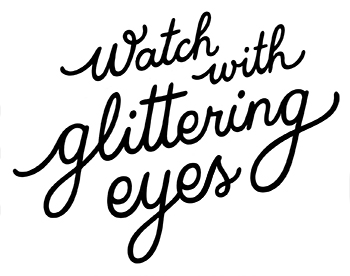* SPIRITUALITY & PHILOSOPHY *

The Alchemist, Paulo Coelho
An enchanting allegorical novel full of wisdom, The Alchemist follows Santiago, an Andalusian shepherd boy who travels from his Spanish homeland to the Egyptian desert, after having a recurring dream of finding a treasure there. What starts out as a journey to find worldly goods turns into a discovery of the treasure found within. A powerful book for anyone seeking direction or purpose in life, and an eternal testament to the importance of listening to our hearts.
Meditations, Marcus Aurelius
Written without any intention of publication, by the only Roman emperor who was also a philosopher, the Meditations of Marcus Aurelius (AD 121-180) offer a remarkable series of challenging spiritual reflections developed as the emperor struggled to understand himself and make sense of the universe. Considered one of the most important works in Stoic philosophy, the book covers very diverse topics such as the nature of moral virtue, human rationality, divine providence, and Marcus’ own emotions. This timeless collection of extended meditations and short aphorisms has been consulted and admired by statesmen, thinkers and readers through the centuries.
The Four Agreements, Don Miguel Ruiz
In this book based on ancient Toltec wisdom, Don Miguel Ruiz reveals the source of self-limiting beliefs that rob us of joy and create needless suffering. The Four Agreements offers a powerful code of conduct that can transform our lives to a new experience of freedom, happiness and love. The Four Agreements are: Be Impeccable With Your Word, Don’t Take Anything Personally, Don’t Make Assumptions, and Always Do Your Best.
The Art of Happiness: A Handbook for Living, the Dalai Lama & Howard Cutler
The Art of Happiness is a book by the Dalai Lama and the psychiatrist Howard Cutler, who posed questions to the Dalai Lama. Cutler quotes the Dalai Lama at length, providing context and describing some details of the settings in which the interviews took place, as well as adding his own reflections on the issues raised. The book explores training the human outlook that alters perception, the concept that happiness is determined more by the state of one’s mind than by one’s external conditions, circumstances, or events, and that happiness can be achieved through the systematic training of our hearts and minds.
The Consolations of Philosophy, Alain de Botton
In the Consolations of Philosophy, Alain de Botton attempts to console the reader through everyday problems by drawing inspiration and interpreting six of the greatest philosophers. The issues are categorized in a number of chapters with one philosopher used in each: Socrates is used to address ‘unpopularity’, Epicurus for ‘not having enough money’, Seneca for ‘frustration’, Montaigne for ‘inadequacy’, Schopenhauer for a ‘broken heart’, and Nietzsche for ‘difficulties’.
The Power of Now, Eckhart Tolle
Ekhart Tolle’s message is simple: living in the now is the truest path to happiness and enlightenment. The Power of Now draws from a variety of spiritual traditions, including Buddhism, mysticism, New Age and Zen, to describe a belief system based on living in the present moment. Its core message is that people’s emotional problems are rooted in their identification with their minds. Tolle teaches the readers how to be aware of the present moment instead of losing themselves in worry and anxiety about the past or future. The book describes methods of relaxation and meditation to aid readers in anchoring themselves in the present.
* TRAVEL *
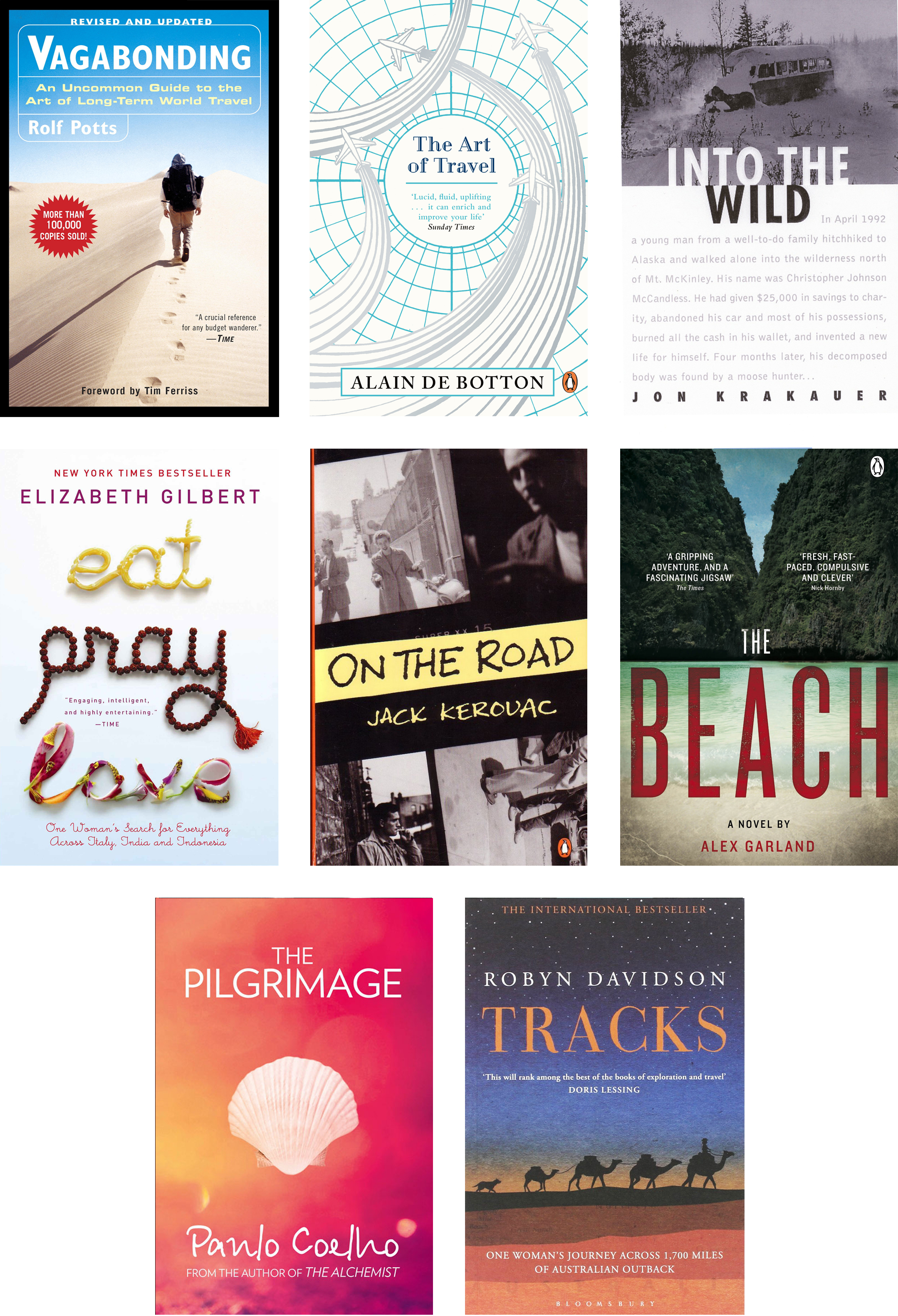
Vagabonding: An Uncommon Guide to the Art of Long-Term World Travel, Rolf Potts
In this one-of-a-kind handbook, veteran travel writer Rolf Potts explains how anyone armed with an independent spirit can achieve the dream of extended overseas travel. Vagabonding is an accessible and inspiring guide to financing your travel time, determining your destination, adjusting to life on the road, working and volunteering overseas, handling travel adversity, and re-assimilating back into ordinary life.
The Art of Travel, Alain de Botton
Although we are inundated with advice on where to travel to, we seldom ask why we go and how we might become more fulfilled by doing so. The Art of Travel is a wonderfully crafted guide to intelligent travel. In each chapter, de Botton invites artists, writers and thinkers – including Gustave Flaubert, Edward Hopper, Wordsworth and Van Gogh – to serve as guides for explorations and thoughts on the act of traveling and the different ways travel may benefit our soul.
Into the Wild, Jon Krakauer
In 1992, Christopher Johnson McCandless gave $25,000 in savings to charity, abandoned his car and most of his possessions, burned all the cash in his wallet, and invented a new life for himself. He gave himself a new identity – Alexander Supertramp – and, unencumbered by money and belongings, he freed himself to wallow in the raw, unfiltered experiences that nature presented. Leaving behind his desperate parents and sister, he vanished into the wild.
Eat Pray Love, Elizabeth Gilbert
At 32 years old, Elizabeth Gilbert had everything a modern American woman was supposed to want – a husband, a home, and a successful career – but instead of feeling happy and fulfilled, she felt consumed by panic and confusion. This memoir chronicles the author’s trip around the world after her divorce and a crushing depression, and what she discovered during her travels. Gilbert set out to examine three different aspects of her nature, set against the backdrop of three different cultures: She spent four months in Italy, eating and enjoying life (“Eat”), three months in India, finding her spirituality (“Pray”), and ended the year in Bali looking for “balance” of the two, and fell in love with a Brazilian businessman (“Love”).
On the Road, Jack Kerouac
On the Road is a novel by American writer Jack Kerouac, based on his travels with his friends across America in a quest for self-knowledge and experience. It is considered a defining work of the postwar Beat and Counterculture generations, with its protagonists living life against a backdrop of jazz, poetry, and drug use.
The Beach, Alex Garland
The Beach is a 1996 travel novel by English author Alex Garland. Set in Thailand, it tells the story of a young backpacker’s search for a legendary, idyllic and isolated beach untouched by tourism, and his time there, living in a small, international community of backpackers.
The Pilgrimage, Paulo Coelho
The Pilgrimage is a recollection of Paulo Coelho’s experiences as he made his way across northern Spain on the pilgrimage to Santiago de Compostela. The book recounts the spectacular trials of Coelho and his mysterious mentor Petrus, as they journey along the road in search of a miraculous sword. Part adventure story, part guide to self-discovery, the novel explores the need to find one’s own path.
Tracks, Robyn Davidson
In 1977, Robyn Davidson set off on a perilous journey across 1,700 miles of hostile Australian desert to the sea with only four camels and a dog for company. Tracks is the compelling, candid story of her odyssey of discovery and transformation.
* VEGANISM & ANIMAL RIGHTS *
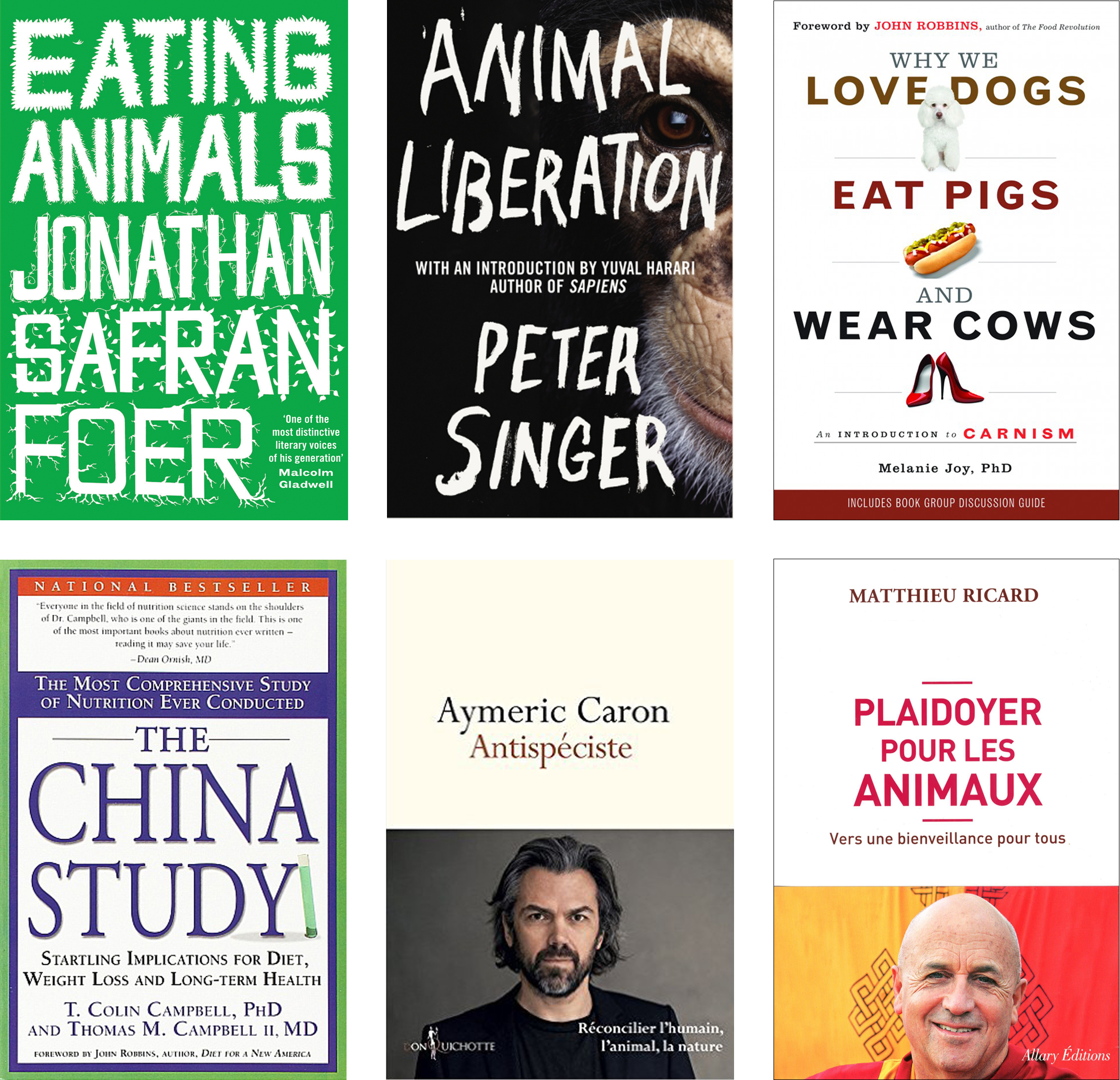
Eating Animals, Jonathan Safran Foer
Jonathan Safran Foer spent much of his teenage and college years oscillating between carnivore and vegetarian. As he became a husband and a father, he kept returning to two questions: Why do we eat animals? And would we eat them if we knew how they got on our dinner plates? Brilliantly synthesizing philosophy, literature, science, and his own undercover detective work, Eating Animals explores the many fictions we use to justify our eating habits-from folklore to pop culture to family traditions and national myth-and how such tales justify a brutal ignorance.
Animal Liberation, Peter Singer
Animal Liberation: A New Ethics for Our Treatment of Animals is a 1975 book by Australian philosopher Peter Singer. It is widely considered within the animal liberation movement to be the founding philosophical statement of its ideas. Singer argues that the interests of animals should be considered because of their ability to experience suffering and that the idea of rights was not necessary in order to consider them. He popularized the term “speciesism” in the book, which had been coined by Richard D. Ryder to describe the exploitative treatment of animals. Singer exposes the chilling realities of today’s factory farms and product-testing procedures, offering sound, humane solutions to what has become a profound environmental, social and moral issue. An important and persuasive appeal to conscience, fairness, decency and justice, Animal Liberation is an essential read for the supporter and the skeptic alike.
Why We Love Dogs, Eat Pigs, and Wear Cows: An Introduction to Carnism, Melanie Joy
Social psychologist Melanie Joy explores the many ways we numb ourselves and disconnect from our natural empathy for farmed animals. She coins the term “carnism” to describe the belief system that has conditioned us to eat certain animals and not others. Joy investigates factory farming, exposing how cruelly animals are treated, the hazards meat-packing workers face, and the environmental impact of raising 10 billion animals for food each year. Controversial and challenging, this book will change the way you think about food forever. Watch her Tedx talk here.
The China Study, T. Colin Campbell, Thomas M. Campbell
The China Study examines the relationship between the consumption of animal products and chronic illnesses such as coronary heart disease, diabetes and cancer. The authors conclude that people who eat a whole-food, plant-based/vegan diet – avoiding all animal products including beef, pork, poultry, fish, eggs, cheese and milk – will escape, reduce or reverse the development of numerous diseases. The New York Times has recognized the study as the “Grand Prix of epidemiology” and the “most comprehensive large study ever undertaken of the relationship between diet and the risk of developing disease.”
Antispéciste, Aymeric Caron
Antispéciste explores the realms of genetics, cosmology, ethology, law and philosophy to explain why we need to give certain fundamental rights to non-human sentient animals. But this extension of our sphere of moral consideration falls within a much larger reflection. By inviting us to rethink the place that humans occupy in the universe, Antispéciste decodes the reasons why the traditional political ecology fails and proposes a new project called essential ecology, that must lead to a constitutional reform to take into consideration the intrinsic value of all living beings.
Plaidoyer pour les Animaux (A Plee for Animals), Matthieu Ricard
A powerful and wide-ranging indictment of the treatment of animals by humans, and an eloquent plea for animal rights. Every cow just wants to be happy. Every chicken just wants to be free. Every bear, dog, or mouse experiences sorrow and feels pain as intensely as any of us humans do. In a compelling appeal to reason and human kindness, French writer and Buddhist monk Matthieu Ricard takes the arguments from his best-sellers Altruism: The Power of Compassion to Change Yourself and the World and Happiness to their logical conclusion: that compassion toward all beings, including our fellow animals, is a moral obligation and the direction toward which any enlightened society must aspire. He chronicles the appalling sufferings of the animals we eat, wear, and use for adornment or “entertainment,” and submits every traditional justification for their exploitation to scientific evidence and moral scrutiny. What arises is an unambiguous and powerful ethical imperative for treating all of the animals with whom we share this planet with respect and compassion.
* CREATIVITY & WORK *
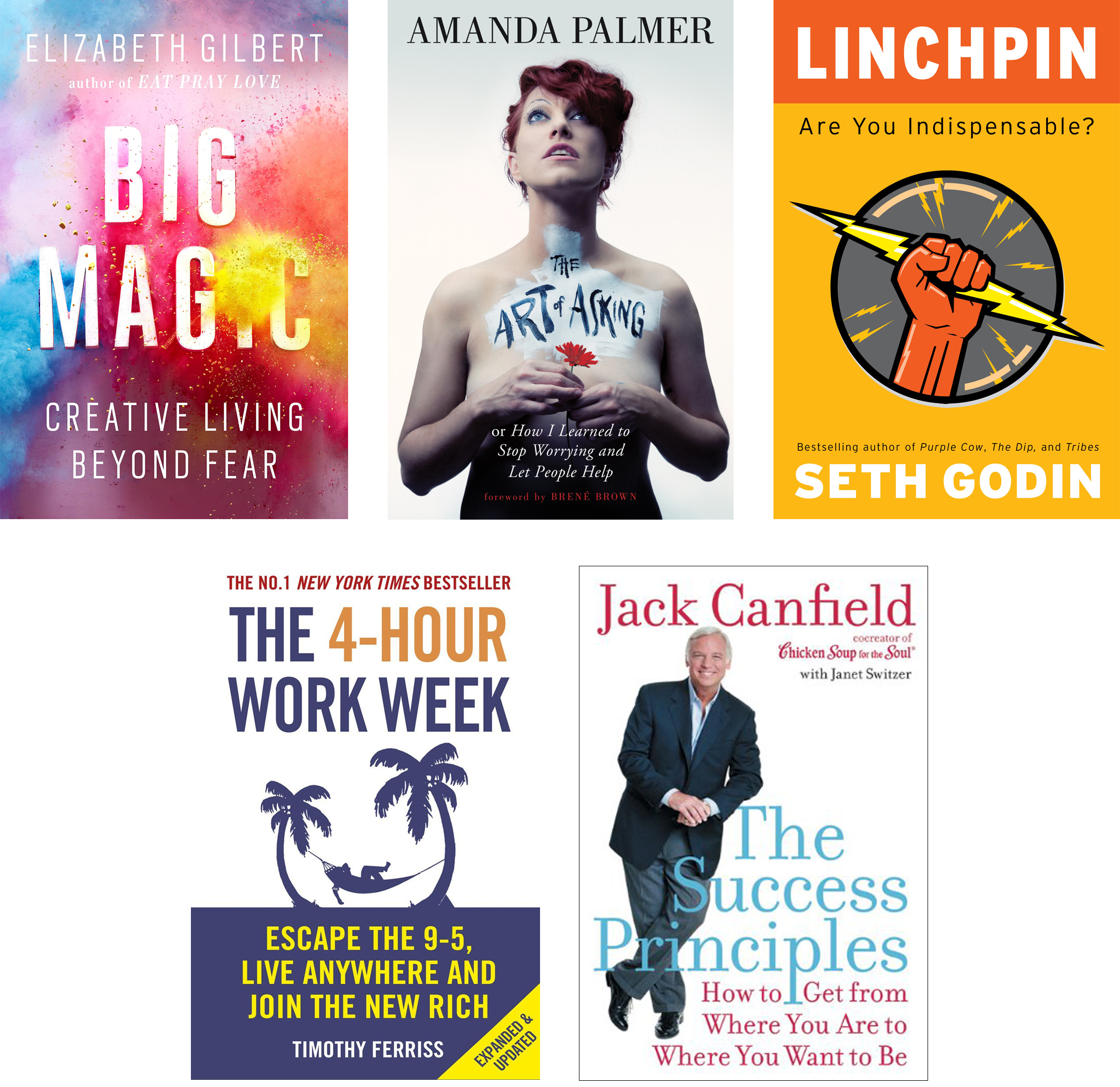
Big Magic, Elizabeth Gilbert
The beloved author of Eat Pray Love digs deep into her own generative process to share her wisdom and unique perspective about creativity. With profound empathy and radiant generosity, Elizabeth Gilbert offers potent insights into the mysterious nature of inspiration. She asks us to embrace our curiosity and let go of needless suffering. She shows us how to tackle what we most love, and how to face down what we most fear. She discusses the attitudes, approaches, and habits we need in order to live our most creative lives. Balancing between soulful spirituality and cheerful pragmatism, Gilbert encourages us to uncover the “strange jewels” that are hidden within each of us. Whether we are looking to write a book, make art, find new ways to address challenges in our work, embark on a dream long deferred, or simply infuse our everyday lives with more mindfulness and passion, Big Magic cracks open a world of wonder and joy.
The Art of Asking, Amanda Palmer
Rock star, crowdfunding pioneer, and TED speaker Amanda Palmer knows all about asking. Performing as a living statue in a wedding dress, she wordlessly asked thousands of passersby for their dollars. When she became a singer, songwriter, and musician, she was not afraid to ask her audience to support her as she surfed the crowd (and slept on their couches while touring). And when she left her record label to strike out on her own, she asked her fans to support her in making an album, leading to the world’s most successful music Kickstarter. Even while Amanda is both celebrated and attacked for her fearlessness in asking for help, she finds that there are important things she cannot ask for – as a musician, as a friend, and as a wife. She learns that she isn’t alone in this, that so many people are afraid to ask for help, and it paralyzes their lives and relationships. In this groundbreaking book, she explores these barriers in her own life and in the lives of those around her, and discovers the emotional, philosophical, and practical aspects of the art of asking. Part manifesto, part revelation, this is the story of an artist struggling with the new rules of exchange in the twenty-first century, both on and off the Internet. The Art of Asking will inspire readers to rethink their own ideas about asking, giving, art, and love.
Linchpin: Are You Indispensable?, Seth Godin
‘The only way to get what you’re worth is to stand out, to exert emotional labor, to be seen as indispensable, and to produce interactions that organizations and people care deeply about.’
In bestsellers such as Purple Cow and Tribes, Seth Godin taught readers how to make remarkable products and spread powerful ideas. But this book is different. It’s about you – your choices, your future, and your potential to make a huge difference in whatever field you choose. There used to be two teams in every workplace: management and labor. Now there’s a third team, the linchpins. These people invent, lead (regardless of title), connect others, make things happen, and create order out of chaos. They figure out what to do when there’s no rule book. They delight and challenge their customers and peers. They love their work, pour their best selves into it, and turn each day into a kind of art. Linchpins are the essential building blocks of great organizations. Like the small piece of hardware that keeps a wheel from falling off its axle, they may not be famous but they’re indispensable. And in today’s world, they get the best jobs and the most freedom. Have you ever found a shortcut that others missed? Seen a new way to resolve a conflict? Made a connection with someone others couldn’t reach? Even once? Then you have what it takes to become indispensable, by overcoming the resistance that holds people back. As Godin writes, ‘Every day I meet people who have so much to give but have been bullied enough or frightened enough to hold it back. It’s time to stop complying with the system and draw your own map. You have brilliance in you, your contribution is essential, and the art you create is precious. Only you can do it, and you must.’
The 4-Hour Workweek, Tim Ferriss
Forget the old concept of retirement and the rest of the deferred-life plan: there is no need to wait and every reason not to, especially in unpredictable economic times. Whether your dream is escaping the rat race, experiencing high-end world travel, earning a monthly five-figure income with zero management, or just living more and working less, The 4-Hour Workweek is the blueprint.This step-by-step guide to luxury lifestyle design teaches: how Tim went from $40,000 per year and 80 hours per week to $40,000 per month and 4 hours per week; how to outsource your life to overseas virtual assistants for $5 per hour and do whatever you want; how blue-chip escape artists travel the world without quitting their jobs; how to eliminate 50% of your work in 48 hours using the principles of a forgotten Italian economist; and how to trade a long-haul career for short work bursts and frequent “mini-retirements”.
The Success Principles, Jack Canfield
Jack Canfield, co-creator of the phenomenal bestselling Chicken Soup for the Soul series, turns to the principles he’s studied, taught, and lived for more than 30 years in this practical and inspiring guide that will help any aspiring person get from where they are to where they want to be. The Success Principles will teach you how to increase your confidence, tackle daily challenges, live with passion and purpose, and realize all your ambitions. Not merely a collection of good ideas, this book spells out the 64 timeless principles used by successful men and women throughout history. Taken together and practiced every day, these principles will transform your life beyond your wildest dreams. Filled with memorable and inspiring stories of CEOs, world-class athletes, celebrities, and everyday people, The Success Principles will give you the proven blueprint you need to achieve any goal you desire.
* PERSONAL GROWTH & KNOWLEDGE *
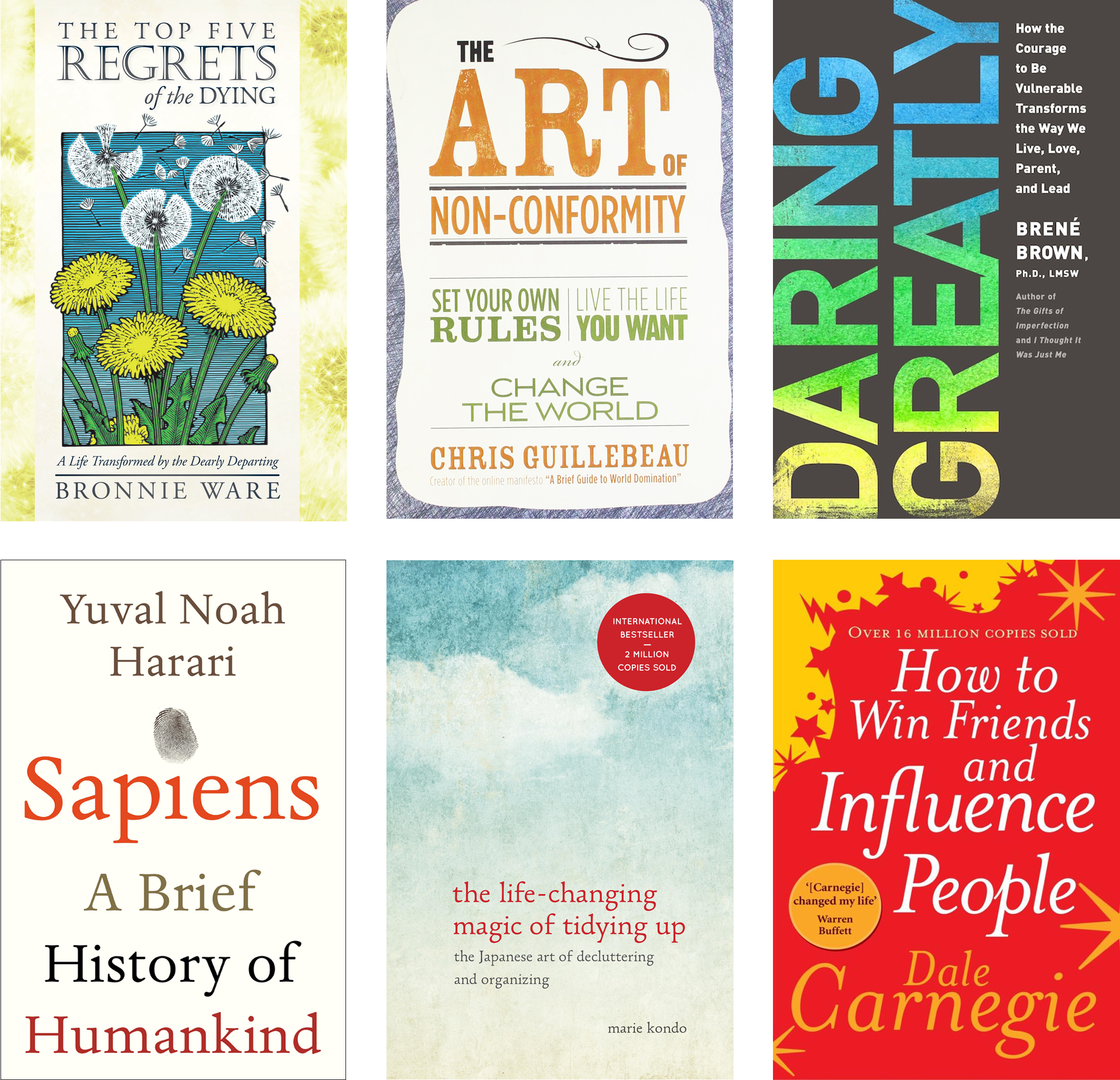
The Top Five Regrets of the Dying, Bronnie Ware
After too many years of unfulfilling work, Bronnie Ware began searching for a job with heart. Despite having no formal qualifications or experience, she found herself in palliative care. Over the years she spent tending to the needs of those who were dying, Bronnie’s life was transformed. Later, she wrote an Internet blog about the most common regrets expressed to her by the people she had cared for. The article, also called The Top Five Regrets of the Dying, gained so much momentum that it was read by more than three million people around the globe in its first year. At the requests of many, Bronnie now shares her own personal story. Bronnie has had a colourful and diverse past, but by applying the lessons of those nearing their death to her own life, she developed an understanding that it is possible for people, if they make the right choices, to die with peace of mind. In this book, she expresses in a heartfelt retelling how significant these regrets are and how we can positively address these issues while we still have the time. The Top Five Regrets of the Dying gives hope for a better world. It is a story told through sharing her inspiring and honest journey, which will leave you feeling kinder towards yourself and others, and more determined to live the life you are truly here to live. This delightful memoir is a courageous, life-changing book.
The Art of Non-Conformity, Chris Guillebeau
Based on Chris Guillebeau’s popular online manifesto A Brief Guide to World Domination, The Art of Non-Conformity defies common assumptions about life and work while arming you with the tools to live differently. You’ll discover how to live on your own terms by exploring creative self-employment, radical goal-setting, contrarian travel, and embracing life as a constant adventure. Inspired and guided by Chris’s own story and those of others who have pursued unconventional lives, you can devise your own plan for world domination – and make the world a better place at the same time.
Daring Greatly, Brené Brown
“It is not the critic who counts; not the man who points out how the strong man stumbles, or where the doer of deeds could have done them better. The credit belongs to the man who is actually in the arena, whose face is marred by dust and sweat and blood; who strives valiantly; . . . who at best knows in the end the triumph of high achievement, and who at worst, if he fails, at least fails while daring greatly.” — Theodore Roosevelt
Every day we experience the uncertainty, risks, and emotional exposure that define what it means to be vulnerable, or to dare greatly. Whether the arena is a new relationship, an important meeting, our creative process, or a difficult family conversation, we must find the courage to walk into vulnerability and engage with our whole hearts. In Daring Greatly, Dr. Brené Brown challenges everything we think we know about vulnerability. Based on twelve years of research, she argues that vulnerability is not weakness, but rather our clearest path to courage, engagement, and meaningful connection. Daring Greatly will spark a new spirit of truth – and trust– in our organizations, families, schools, and communities.
Sapiens: A Brief History of Humankind, Yuval Noah Harari
100,000 years ago, at least six human species inhabited the earth. Today there is just one. Us. Homo sapiens. How did our species succeed in the battle for dominance? Why did our foraging ancestors come together to create cities and kingdoms? How did we come to believe in gods, nations and human rights; to trust money, books and laws; and to be enslaved by bureaucracy, timetables and consumerism? And what will our world be like in the millennia to come? In Sapiens, Dr. Yuval Noah Harari spans the whole of human history, from the very first humans to walk the earth to the radical – and sometimes devastating – breakthroughs of the Cognitive, Agricultural and Scientific Revolutions. Drawing on insights from biology, anthropology, palaeontology and economics, he explores how the currents of history have shaped our human societies, the animals and plants around us, and even our personalities. Have we become happier as history has unfolded? Can we ever free our behaviour from the heritage of our ancestors? And what, if anything, can we do to influence the course of the centuries to come? Bold, wide-ranging and provocative, Sapiens challenges everything we thought we knew about being human: our thoughts, our actions, our power, and our future.
The Life-Changing Magic of Tidying Up, Marie Kondo
Japanese cleaning consultant Marie Kondo takes tidying to a whole new level, promising that if you properly simplify and organize your home once, you’ll never have to do it again. Most methods advocate a room-by-room or little-by-little approach, which doom you to pick away at your piles of stuff forever. The KonMari Method, with its revolutionary category-by-category system, leads to lasting results. With detailed guidance for determining which items in your house ‘spark joy’ (and which don’t), this international best seller featuring Tokyo’s newest lifestyle phenomenon will help you clear your clutter and enjoy the unique magic of a tidy home – and the calm, motivated mindset it can inspire.
How to Win Friends and Influence People, Dale Carnegie
Millions of people around the world have improved their lives based on the teachings of Dale Carnegie. In How to Win Friends and Influence People, he offers practical advice and techniques – in his exuberant and conversational style – for how to get out of a mental rut and make life more rewarding. His advice will teach you how to: make friends quickly and easily, increase your popularity, persuade people to follow your way of thinking, enable you to win new clients and customers, become a better speaker, and boost enthusiasm among your colleagues.
* FEMINISM & WOMEN’S ISSUES *
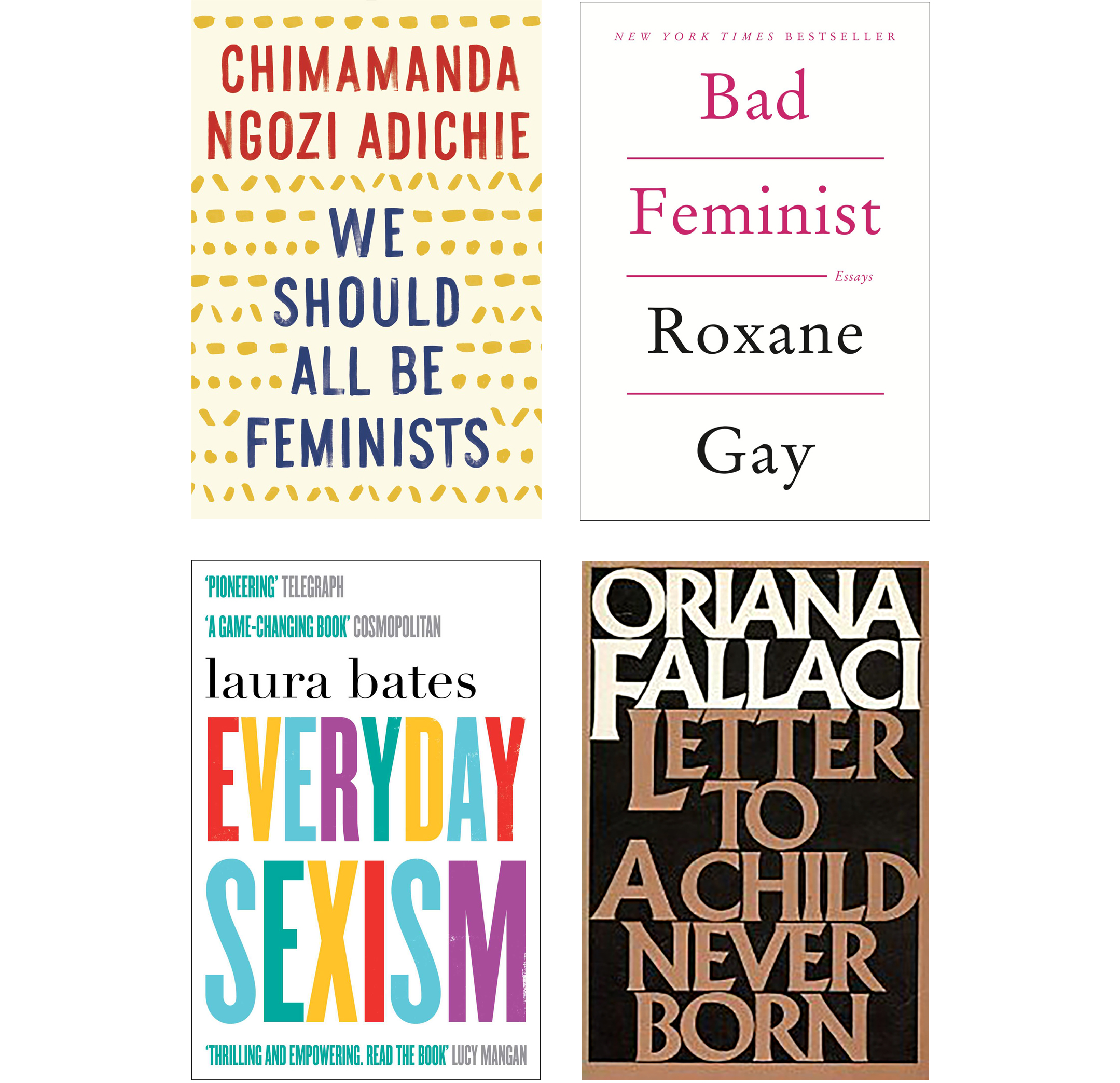
We Should All Be Feminists, Chimamanda Ngozi Adichie
What does ‘feminism’ mean today? That is the question at the heart of We Should All Be Feminists, a personal, eloquently-argued essay – adapted from her much-viewed TEDx talk of the same name – by Chimamanda Ngozi Adichie, the award-winning author of Americanah and Half of a Yellow Sun. With humor and levity, Adichie offers readers a unique definition of feminism for the twenty-first century – one rooted in inclusion and awareness. She shines a light not only on blatant discrimination, but also the more insidious, institutional behaviors that marginalize women around the world, in order to help readers of all walks of life better understand the often masked realities of sexual politics. Throughout, she draws extensively on her own experiences – in the U.S., in her native Nigeria, and abroad – offering an artfully nuanced explanation of why the gender divide is harmful for women and men, alike. Argued in the same observant, witty and clever prose that has made Adichie a bestselling novelist, here is one remarkable author’s exploration of what it means to be a woman today – and an of-the-moment rallying cry for why we should all be feminists.
Bad Feminist, Roxane Gay
Bad Feminist is a 2014 collection of essays by cultural critic, novelist and professor Roxane Gay. The author explores being a feminist while loving things that could seem to go against feminist ideology through essays that explore pop culture and Gay’s personal experiences, covering topics as vast as the Sweet Valley High series, Django Unchained, and Gay’s own upbringing as a Haitian-American. Bad Feminist is a sharp, funny, and spot-on look at the ways in which the culture we consume becomes who we are, and an inspiring call-to-arms of all the ways we still need to do better.
Everyday Sexism, Laura Bates
After experiencing a series of escalating sexist incidents, journalist Laura Bates started the Everyday Sexism Project to collect stories for a piece she was writing on the issue. Astounded by the response she received and the wide range of stories that came pouring in from all over the world, she quickly realized that the situation was far worse than she’d initially thought. From being harassed and wolf-whistled at on the street, to discrimination in the workplace and serious sexual assault, it is clear that sexism had become normalized. But Bates inspires women to lead a real change and writes this extremely powerful book that could, and should, win hearts and minds right across the spectrum. Often shocking, sometimes amusing and always poignant, Everyday Sexism is a protest against inequality and a manifesto for change. Watch Laura Bates’ Tedx talk about Everyday Sexism here.
Letter to a Child Never Born, Oriana Fallaci
My mother’s favorite book. Letter to a Child Never Born (Italian: Lettera a un bambino mai nato) is a 1975 novel by Italian author and journalist Oriana Fallaci. It is the tragic monologue of a woman speaking with the child she carries in her womb. This letter confronts the burning theme of abortion, and the meaning of life, by asking difficult questions: Is it fair to impose life even if it means suffering? Would it be better not to be born at all? Letter to a Child Never Born touches on the real meaning of being a woman: the power to give life or not. When the book begins, the protagonist is upset after learning she is pregnant. She knows nothing about the child, except that this creature depends totally and uniquely on her own choices. The creation of another person directly within one’s own body is a very shocking thing. The sense of responsibility is huge; it is a heavy burden that gives life to endless reflections, from the origin of our existence to the shame of our selfishness. If the child could choose, would he prefer to be born, to grow up, and to suffer, or would he return to the joyful limbo from which he came? A woman’s freedom and individuality are also challenged by a newborn – should she renounce her freedom, her job, and her choice?
* MISCELLANEOUS *
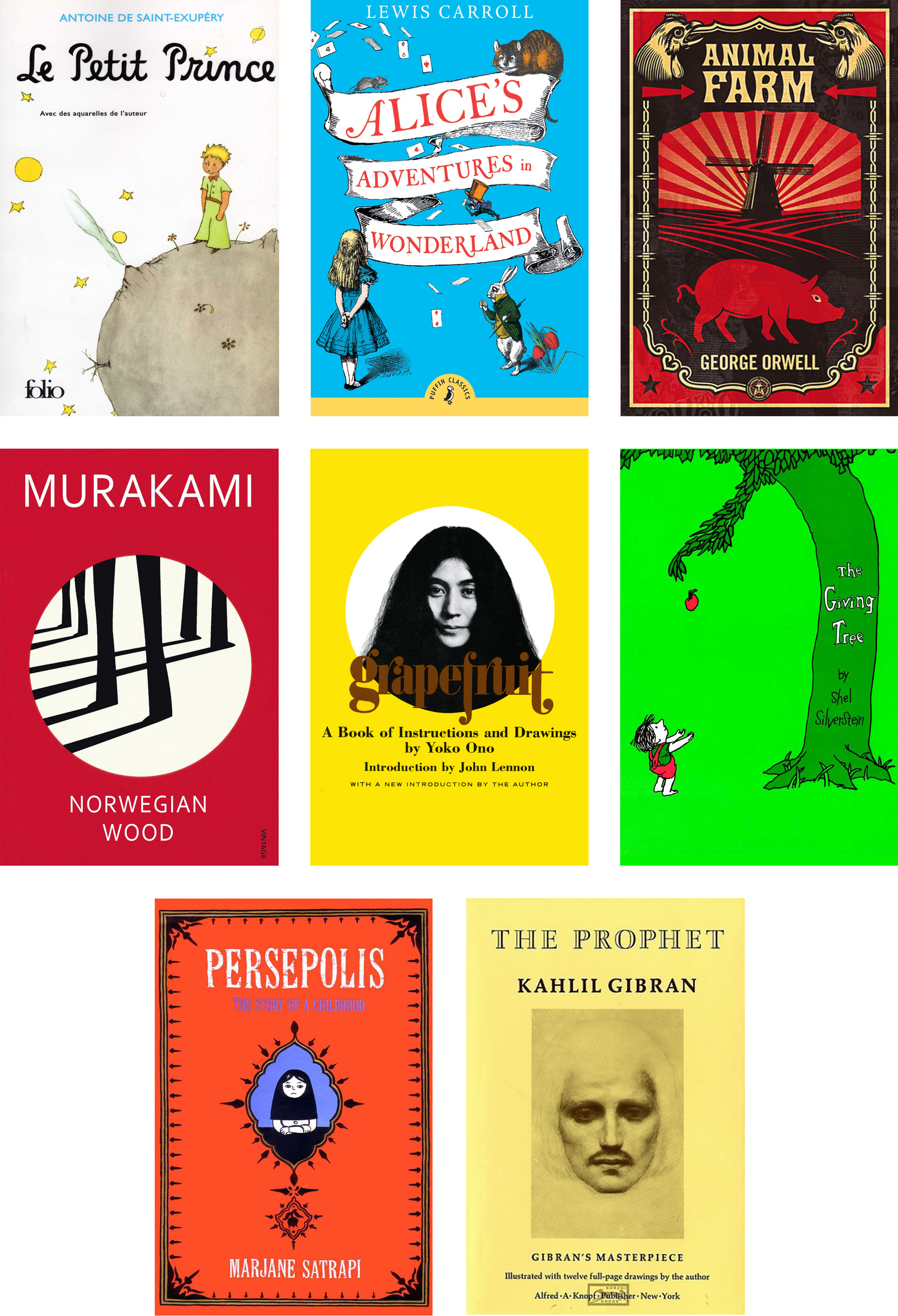
Le Petit Prince, Antoine de Saint-Exupéry
Moral allegory and spiritual autobiography, Le Petit Prince is the most translated book in the French language, the fourth most translated book in the world, and one of the best-selling books ever published. With a timeless charm, it tells the story of a little boy who leaves the safety of his own tiny planet to travel the universe, learning the vagaries of adult behavior through a series of extraordinary encounters. His personal odyssey culminates in a voyage to Earth and further adventures.
Alice’s Adventures in Wonderland, Lewis Carroll
The young and imaginative Alice follows a hasty hare underground – to come face-to-face with some of the strangest adventures and most fantastic characters in all of literature. In penning this brilliant burlesque of children’s literature, Lewis Carroll has written a farcical satire of rigid Victorian society, an arresting parody of the fears, anxieties, and complexities of growing up. The tale plays with logic, giving the story lasting popularity with adults as well as with children. It is considered to be one of the best examples of the literary nonsense genre.
Animal Farm, George Orwell
‘All animals are equal but some animals are more equal than others.‘
Animal Farm is an allegorical and dystopian novella by George Orwell, first published in England on 17 August 1945. According to Orwell, the book reflects events leading up to the Russian Revolution of 1917 and then on into the Stalinist era of the Soviet Union. Orwell described Animal Farm as a satirical tale against Stalin, and in his essay ‘Why I Write’ (1946), wrote that Animal Farm was the first book in which he tried, with full consciousness of what he was doing, “to fuse political purpose and artistic purpose into one whole”. Orwell’s allegory of the Soviet revolution remains as lucid and compelling as ever. In beautifully clear prose, he gives us a vivid gallery of characters and a fable that conveys the truth about how we are manipulated through language and the impossibility of finding heaven on earth.
Norwegian Wood, Haruki Murakami
Norwegian Wood is a nostalgic story of loss and burgeoning sexuality. It is told from the perspective of Toru Watanabe, who looks back on his days as a college student living in Tokyo, at a time when Japanese students —like those of many other nations — were protesting against the established order. Through Watanabe’s reminiscences we see him develop relationships with two very different women — the beautiful yet emotionally troubled Naoko, and the outgoing, lively Midori.
Grapefruit, Yoko Ono
Grapefruit is an artist’s book written by Yoko Ono, originally published in 1964. It has become famous as an early example of conceptual art, containing a series of “event scores” that replace the physical work of art – the traditional stock-in-trade of artists – with instructions that an individual may, or may not, wish to enact. Event Scores, involve simple actions, ideas, and objects from everyday life recontexualized as performance. They are texts that can be seen as proposal pieces or instructions for actions. The idea of the score suggests musicality. Like a musical score, Event Scores can be realized by artists other than the original creator and are open to variation and interpretation.
The Giving Tree, Shel Silverstein
‘Once there was a tree… and she loved a little boy.’
So begins a story of unforgettable perception, beautifully written and illustrated by the gifted and versatile Shel Silverstein. Every day the boy would come to the tree to eat her apples, swing from her branches, or slide down her trunk…and the tree was happy. But as the boy grew older he began to want more from the tree, and the tree gave and gave and gave.
This is a tender story, touched with sadness, aglow with consolation. Shel Silverstein has created a moving parable for readers of all ages that offers an affecting interpretation of the gift of giving and a serene acceptance of another’s capacity to love in return.
Persepolis, Marjane Satrapi
Wise, funny, and heartbreaking, Persepolis is Marjane Satrapi’s memoir of growing up in Iran during the Islamic Revolution. In powerful black-and-white comic strip images, Satrapi tells the story of her life in Tehran from ages six to fourteen, years that saw the overthrow of the Shah’s regime, the triumph of the Islamic Revolution, and the devastating effects of war with Iraq. The intelligent and outspoken only child of committed Marxists and the great-granddaughter of one of Iran’s last emperors, Marjane bears witness to a childhood uniquely entwined with the history of her country.
The Prophet, Khalil Gibran
Kahlil Gibran’s masterpiece is one of the most beloved classics of our time. The Prophet is a collection of poetic essays that are philosophical, spiritual, and, above all, inspirational. Gibran’s musings are divided into 28 chapters covering such sprawling topics as love, marriage, children, giving, eating and drinking, work, joy and sorrow, housing, clothes, buying and selling, crime and punishment, laws, freedom, reason and passion, pain, self-knowledge, teaching, friendship, talking, time, good and evil, prayer, pleasure, beauty, religion, and death.
